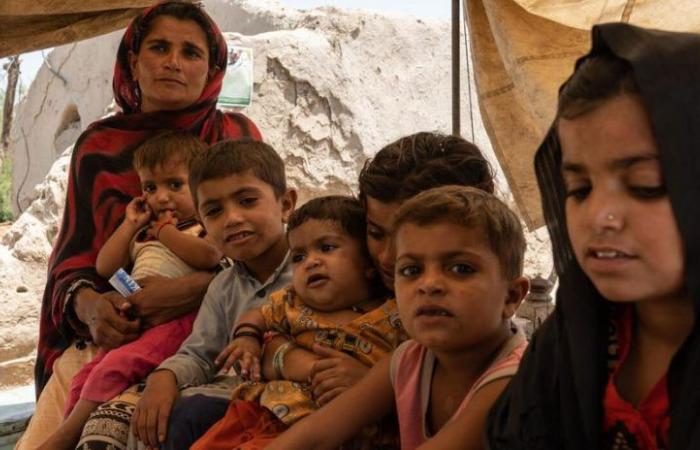The United Nations Children’s Fund (UNICEF) has warned that current record temperatures are putting children in Pakistan at risk of heat stress. Minors are also more likely to suffer from air pollution than adults, leading to potentially fatal respiratory illnesses. Around 12% of deaths of Pakistani children under the age of five “are due to air pollution”.
The United Nations Children’s Fund (UNICEF) has warned that the current record temperatures are putting all children in Pakistan at risk of heat stress as they are unable to recover from the excess heat in their bodies.
Minors are also more likely to suffer from air pollution than adults, leading to potentially fatal respiratory illnesses. Around 12% of deaths of Pakistani children under the age of five “are due to air pollution”.
In parts of Pakistan’s southern Sindh province, including Jacobabad, the world’s hottest city in 2022, temperatures were in the 40s in June, exposing 1.8 million people to serious health risks.
According to Unicef’s 2021 Child Climate Risk Index, Ccri, children in Afghanistan, Bangladesh, India, Maldives and Pakistan are at “extremely high risk” of experiencing the impacts of climate change.
South Asia has the highest percentage of children exposed to extremely high temperatures compared to all other regions, according to a UNICEF analysis.
The agency estimates that 76% of children under the age of 18 in the region, representing 460 million people, are exposed to extreme heat. This category implies a location where 83 or more days in a year exceed 35ºC.
An estimated three in four children in South Asia are already exposed to high temperatures, compared to just one in three children globally. The analysis uses data from 2020, the most recent available.
Even during the rainy season, the heat can make the situation worse for children. Because they cannot adapt quickly to changes in temperature, they are not able to remove excess heat from their bodies.
The situation can cause symptoms and illnesses such as higher body temperature, rapid heartbeat, colic, intense headache, confusion, organ failure, dehydration, fainting and coma, leading to the child’s death.
Global warming
According to scientists’ warning, the world has reached a pre-collapse limit with global warming. The global average temperature in July last year was around 1.5°C warmer than the pre-industrial era that ended in the mid-19th century, according to the European Union’s Copernicus Climate Change Service.
The average surface temperature of the oceans also reached a record 20.96ºC last year, according to data from the European Copernicus observatory released in July 2023. Scientists were already warning of an immediate threat.
This peak — which, according to the ERA5 database, was reached on July 30 — surpassed “the previous record, of 20.95ºC, from March 2016,” a Copernicus spokesperson told AFP. The oceans absorb 90% of the excess heat in the Earth system caused by industrial-era human activity.
The 1.5-degree threshold is significant because scientists consider it a fundamental tipping point for the planet, beyond which the chances of extreme heat, floods, droughts, wildfires, and food and water shortages will become even more unfavorable for life as we know it.
The United Nations (UN) developed a series of ambitious objectives in 2015 through a “Global Compact”, which involves its 193 member countries. The UN project includes 17 SDGs, that is, Sustainable Development Goals.
The joint effort integrates different sectors of member countries, such as companies, CSOs and civil society itself. In other words, everyone must join forces to achieve the same goals that, in the end, impact everyone’s lives.
SDG 13, which talks about taking urgent measures to combat climate change and its impacts, needs to be put into practice immediately. The entire planet is already suffering from climate change, especially children.
Source: UN News






